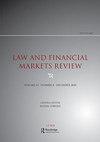津巴布韦内幕交易监管的利弊
Q2 Social Sciences
引用次数: 0
摘要
关于内幕交易监管的争论已经存在了几十年,至今仍未解决。例如,对内幕交易放松管制的支持者认为,不应将其视为犯罪,而对内幕交易进行监管的支持者则认为,这一犯罪可能会引发一系列问题,如市场效率低下、市场诚信低下以及公众投资者对任何国家金融市场的信心低下。津巴布韦决策者似乎也将内幕交易视为津巴布韦金融市场的犯罪行为。因此,津巴布韦目前禁止内幕交易。值得注意的是,内幕交易主要是为了增强津巴布韦金融市场的公众投资者信心、市场效率和市场诚信。因此,根据经修订的2004年第17号《证券法》[第24:25章],津巴布韦依法禁止内幕交易活动。在此背景下,本文对内幕交易监管与放松管制之争的利弊进行了考察。作者认为,由相关执法机构和其他关键角色持续执行的适当内幕交易法可以有效打击任何国家金融市场的内幕交易活动。本文章由计算机程序翻译,如有差异,请以英文原文为准。
The Pros and Cons for Insider Trading Regulation in Zimbabwe
The debate on the regulation of insider trading has existed for several decades and it remains unresolved to date. For instance, proponents for the deregulation of insider trading argue that it should not be treated as an offence while proponents for the regulation of insider trading contend that it is an offence that could, inter alia, give rise to a host of problems such as poor market efficiency, poor market integrity and low public investor confidence in the financial markets of any country. It appears the Zimbabwean policy makers also view insider trading as an offence in the Zimbabwean financial markets. Consequently, insider trading is currently outlawed in Zimbabwe. Notably, insider trading is mainly prohibited to enhance public investor confidence, market efficiency and market integrity in the Zimbabwean financial markets. Accordingly, insider trading activities are statutorily prohihited in Zimbabwe under the Securities Act 17 of 2004 [Chapter 24:25] as amended (Securities Act). Given this background, the article investigates the merits and demerits of the insider trading regulation and deregulation debate. The authors submit that adequate insder trading laws that are consistently enforced by the relevant enforcement authorities and other key role-players could effectively combat insider trading activities in the financial markets of any country.
求助全文
通过发布文献求助,成功后即可免费获取论文全文。
去求助
来源期刊
CiteScore
1.40
自引率
0.00%
发文量
0
期刊介绍:
The Law and Financial Markets Review is a new, independent, English language journal devoted to providing high quality information, comment and analysis for lawyers specialising in banking and financial market issues and to others with interests in legal and regulatory developments affecting the financial markets. Published four times a year LFMR contains articles written by leading experts providing a forum for practical guidance on, as well as reflective and topical analysis of, all major jurisdictions, with a particular focus on the interaction between the law and market practice and behaviour.

 求助内容:
求助内容: 应助结果提醒方式:
应助结果提醒方式:


